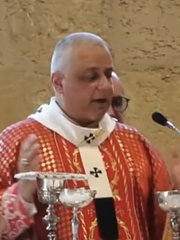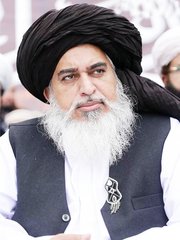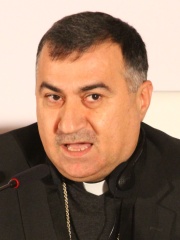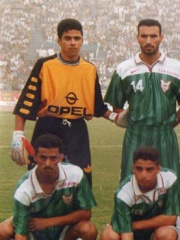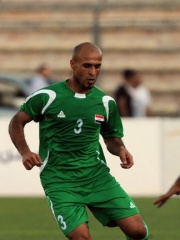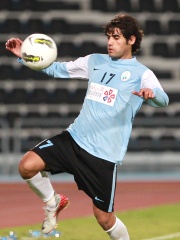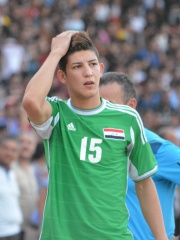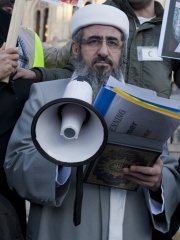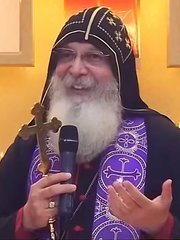RELIGIOUS FIGURE
Murder of Du'a Khalil Aswad
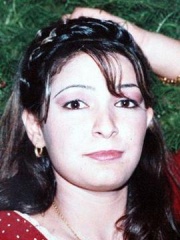
 Murder of Du'a Khalil Aswad
Murder of Du'a Khalil Aswad
Du'a Khalil Aswad (دعاء خليل أسود) (c. 1989 – c. 7 April 2007) was a 17-year-old Iraqi Yazidi girl who was stoned to death in Bashiqa, Nineveh, northern Iraq in early April 2007, in an honor killing. Her killers accused her of dishonoring her family and religion. Read more on Wikipedia
Her biography is available in 18 different languages on Wikipedia. Murder of Du'a Khalil Aswad is the 3,121st most popular religious figure, the 369th most popular biography from Iraq and the 42nd most popular Iraqi Religious Figure.
Du'a Khalil Aswad is most famous for being the victim of an honor killing in Iraq in 2007, which drew international attention and condemnation. Her murder highlighted issues of gender-based violence and the cultural practices surrounding honor in some communities.
Memorability Metrics
Page views of Murder of Du'a Khalil Aswad by language
Among RELIGIOUS FIGURES
Among religious figures, Murder of Du'a Khalil Aswad ranks 3,121 out of 3,187. Before her are Ellen White, Ted Haggard, Nouman Ali Khan, Gian Franco Saba, Khadim Hussain Rizvi, and Julian Leow Beng Kim. After her are Detention of Pavel Pernikaŭ, Aïda Yazbeck, and Hamza Yusuf.
Most Popular Religious Figures in Wikipedia
Go to all RankingsEllen White
HPI: 42.21
Rank: 3,115
Ted Haggard
1956 - Present
HPI: 41.86
Rank: 3,116
Nouman Ali Khan
1978 - Present
HPI: 41.47
Rank: 3,117
Gian Franco Saba
1968 - Present
HPI: 40.66
Rank: 3,118
Khadim Hussain Rizvi
1966 - 2020
HPI: 40.53
Rank: 3,119
Julian Leow Beng Kim
1964 - Present
HPI: 40.52
Rank: 3,120
Murder of Du'a Khalil Aswad
HPI: 39.82
Rank: 3,121
Detention of Pavel Pernikaŭ
HPI: 35.78
Rank: 3,122
Aïda Yazbeck
HPI: 34.76
Rank: 3,123
Hamza Yusuf
1958 - Present
HPI: 29.53
Rank: 3,124
In Iraq
Among people born in Iraq, Murder of Du'a Khalil Aswad ranks 369 out of 384. Before her are Aymen Hussein (1996), Nashat Akram (1984), Bashar Warda (1969), Noor Sabri (1984), Bassim Abbas (1982), and Emad Mohammed (1982). After her are Haidar Abdul-Razzaq (1982), Alaa Abdul-Zahra (1987), Jalal Hassan (1991), Mohanad Ali (2000), Bassam Al-Rawi (1997), and Dhurgham Ismail (1994).
Others born in Iraq
Go to all RankingsAymen Hussein
SOCCER PLAYER
1996 - Present
HPI: 43.35
Rank: 363
Nashat Akram
SOCCER PLAYER
1984 - Present
HPI: 43.22
Rank: 364
Bashar Warda
RELIGIOUS FIGURE
1969 - Present
HPI: 42.48
Rank: 365
Noor Sabri
SOCCER PLAYER
1984 - Present
HPI: 42.43
Rank: 366
Bassim Abbas
SOCCER PLAYER
1982 - Present
HPI: 41.89
Rank: 367
Emad Mohammed
SOCCER PLAYER
1982 - Present
HPI: 40.50
Rank: 368
Murder of Du'a Khalil Aswad
RELIGIOUS FIGURE
HPI: 39.82
Rank: 369
Haidar Abdul-Razzaq
SOCCER PLAYER
1982 - 2022
HPI: 39.70
Rank: 370
Alaa Abdul-Zahra
SOCCER PLAYER
1987 - Present
HPI: 39.32
Rank: 371
Jalal Hassan
SOCCER PLAYER
1991 - Present
HPI: 39.15
Rank: 372
Mohanad Ali
SOCCER PLAYER
2000 - Present
HPI: 39.03
Rank: 373
Bassam Al-Rawi
SOCCER PLAYER
1997 - Present
HPI: 39.03
Rank: 374
Dhurgham Ismail
SOCCER PLAYER
1994 - Present
HPI: 37.99
Rank: 375
Among RELIGIOUS FIGURES In Iraq
Among religious figures born in Iraq, Murder of Du'a Khalil Aswad ranks 42. Before her are Abu al-Hasan al-Hashimi al-Qurashi (1980), Mullah Krekar (1956), Paulos Faraj Rahho (1942), Sajida al-Rishawi (1970), Mari Emmanuel (1970), and Bashar Warda (1969).
Abu al-Hasan al-Hashimi al-Qurashi
1980 - 2022
HPI: 56.17
Rank: 36
Mullah Krekar
1956 - Present
HPI: 55.76
Rank: 37
Paulos Faraj Rahho
1942 - 2008
HPI: 55.55
Rank: 38
Sajida al-Rishawi
1970 - 2015
HPI: 52.76
Rank: 39
Mari Emmanuel
1970 - Present
HPI: 48.90
Rank: 40
Bashar Warda
1969 - Present
HPI: 42.48
Rank: 41
Murder of Du'a Khalil Aswad
HPI: 39.82
Rank: 42



